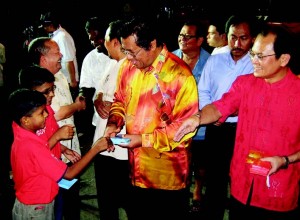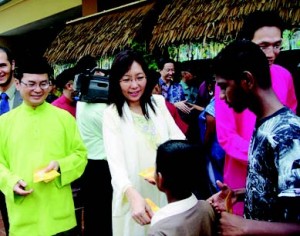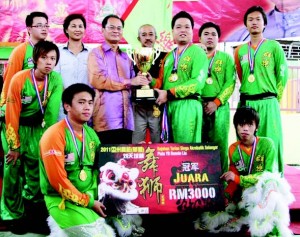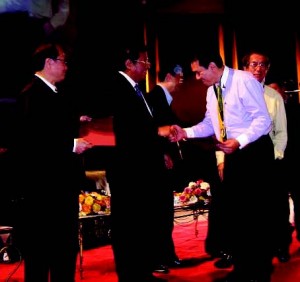 As the executive councillor (EXCO) with one of the most visible portfolios in Selangor, Ronnie Liu clocks a frenetic pace at his work. Media attention has been compounded by the almost ceaseless attacks from his detractors. But Ronnie knows it comes with the turf.
As the executive councillor (EXCO) with one of the most visible portfolios in Selangor, Ronnie Liu clocks a frenetic pace at his work. Media attention has been compounded by the almost ceaseless attacks from his detractors. But Ronnie knows it comes with the turf.
The fact that Selangor is run by opposition parties and the most advanced and prosperous state in Malaysia means that the stakes are higher here. A policy misquote or foul-up by any local council will instantly top the headlines of mainstream media looking to sully Pakatan’s reputation at every juncture. Yet Ronnie has taken it all in stride, sharpened by years of political battles with BN.
The Rocket had a long chat with Ronnie to hear his take on Selangor, the local councils and how he handles the controversies that surround him.
As a first term Exco of Selangor, how have you adapted to the role? How have the civil servants themselves accepted it?
Many of the civil servants, especially those who were UMNO members, were initially cautious toward me because of my past opposition toward the previous government. Many were wary if there would be any backlash and witch-hunts from me.
However, as part of the Pakatan Rakyat (PR) team, we were focused on ensuring a stable government. We set out to assure the local council mayors and council presidents (YDP) that they will be allowed to complete their tenure; we wanted continuance. Reforms were to be carried out later.
In any case, nine of the YDPs have left not because we terminated their contracts but for other reasons. This has helped to allay the fear of other civil servants.
As a state assemblyman (ADUN) yourself, how have you managed to handle the various local issues in your state seat?
As an ADUN, I had had to face continuous attacks from the local MCA chapter here, especially from Teh Kim Poh, the previous ADUN for Pandamaran. In order to keep up his relevance, many unsubstantiated allegations were levelled against me.
It was comical at times to hear the allegations. One day he would say that I have neglected to get the local council to tar the roads, just a day after they have done so. Another time it would be “Ronnie Liu didn’t hang Chinese New Year lightings for Pandamaran” even though the light bulbs would be dangling ominously outside his office. His outbursts and antics have kept me in the limelight, for better or for worse. But I took it in stride knowing I have done my duty for my constituents.
What is your daily routine like? What are the challenges that you face in your work?
The position of Exco in charge of local council affairs is a heavy responsibility. The local governance is naturally filled with issues and problems and it has kept me in the media attention. But I learnt to manage it. As a whole I trust the local councillors and YDPs to handle their issues; I don’t micro-manage them. I usually meet all of them once a month to be briefed of their problems and directions.
Additionally, I am also the state chairman of non-Muslim affairs. It is a hectic schedule on this end. As an indication, in my constituency alone I am normally invited to grace an average of three non-Muslim worship venue function events weekly. The portfolio requires me to handle many sensitive issues.
Then there are also many meet-the-people sessions which I have to attend almost daily. These sessions allow us to meet the sympathetic and neutral residents who may vote for us next time, and at times it is hard to say no.
My prominence in the media has also gained me some unrelated correspondence. Many unrelated queries come to me where I have to sort them out before passing it on to other Excos. It is quite time consuming.
With all the undue and biased press coverage of you, how have you deal with it? How do you handle the issues and many negative allegations that have being hurled at you?
It would seem that all problems in the world are linked to me (laughs)! Thank goodness, all the allegations hurled have not been proven at all. I have challenged all these accusers to provide proof and make reports with the police or MACC, yet none have been able to come forward with any concrete proof.
Since PR took over Selangor, no new cyber-cafes, gaming outlets and massage parlours have been approved in the state. Yet even the police and MACC have gotten into the fray by trying to link me with shady dealings, insinuating that there are illegal ones sprouting up under my stead. None has been proven thus far.
As my scope of work and power is very wide, I became an easy target for attack by my detractors. I have made many enemies in the past too, especially on the BN side. I was formerly the national publicity secretary for DAP, and it was my job to attack them. Perhaps I was a little more vocal than the rest; I even published a book titled “MCA’s Role in the Chinese Community: Culprit? Accomplice? Coward?” that zeroed in on MCA leaders’ malfeasance.
Today, I am still as vocal in defending my colleagues in government and DAP. I have ruffled a few feathers along the years with my attacks. However, I have no personal feelings regarding these verbal cross fires and the opponents. My only defence to beat these allegations is to make sure I am clean, upright and perform my duties as I should.
At this juncture how would you rate PR’s performance in governing the state?
 The Selangor state government engages an independent pollster every three months to gauge our popularity level with the people. Thus far we have consistently averaged 60 percent ratings since we took over Selangor. I believe we are on the right track.
The Selangor state government engages an independent pollster every three months to gauge our popularity level with the people. Thus far we have consistently averaged 60 percent ratings since we took over Selangor. I believe we are on the right track.
Can you describe some of the initiatives by the state government in helping the people?
Our efforts at making the economy people-centric have seen us spent close to RM 300 million the last three years. In addition to the free water for all Selangor residents, we have provided allocations for vernacular and religious schools and pocket money for the incoming tertiary students even though education is not the responsibility of the state government. We have also launched a micro credit loan program for the people to assist them in their business ventures, of which RM 50 million is for urban residents and RM 20 million for rural residents.
Additionally, PR has also given out 137 plots of land for non-Muslim worship places, which is more than what the previous BN government provided in the last 50 years. For the schools, RM 4 million have been given to Chinese vernacular schools, RM 6 million for religious schools and RM 4 million for Tamil vernacular schools. The combined total of this aid has exceeded RM 300 million.
Yet in the last three years, the state government’s cash reserve has almost doubled from the 2008 figure of around RM 400 million to RM 832 million as of April this year. When we took over in 2008, the cash reserve was placed in very low interest yielding deposits. We immediately switched it to higher yielding deposits; the increase in the interest was enough to pay all the Excos’ salaries for the next several years.
With all these cash reserves that are accumulating we will sow it back to the people. We have and will continue to support people-centric programs.
What are the issues and problems the state government faces? How is the state government solving them?
One of the areas where we are lacking in is publicity for our efforts. It doesn’t help that the mainstream media often blots out our achievements. Our information dissemination efforts need to be stepped up.
Our current outreach efforts via Selangor Kini, Selangor Times and TV Selangor are still limited. We need to increase the printing and distribution networks of these publications. The rural areas, especially the Malay areas need to be reached more effectively.
The performance of local councils is a crucial one for the state government as it is also the most visible for the people. What are some of the reforms that have taken place thus far?
In the area of cleanliness, the PR administration has set clear guidelines for the local councils to follow and we expect them to adhere to it. In addition, we have created the implementation of a “Clean Zone” in every local council. The intention is to transform dirty-prone places into clean and hygienic places.
There have been many issues and much news coverage regarding the allowable number of tables to be placed adjacent to an eatery’s premise. Generally there are guidelines which the restaurateur has to adhere to and proposals to be submitted before the local councils can approve them. However the local councils must also be prompt in deciding if the proposals are acceptable.
Now non-performing contractors will be monitored. If they fail to adhere to the contract requirements, they will be blacklisted from performing jobs for all other Selangor local councils for two years. We will track this via our state-linked database that is accessible via a web portal know as UPEN.
Can you relate about the financial performance of the local councils?
The total income of all the local councils for 2010 totalled around RM 1.4 billion, which is close to the total income received by the state government at around RM 1.5 billion. All the local councils’ financial performances have improved since we took over. There is a concerted effort to improve revenue collection and spend prudently throughout all local councils.
 For example open tender is now a requirement for all contracts worth more than RM 20,000, while for those contracts below the amount we required three quotations for them. We are seeing results for such efforts. Petaling Jaya City Council (MBPJ) and Klang Municipal Council (MPK) are two of the outstanding examples. MBPJ’s cash reserves improved from RM 80 million to RM 172 million in 2010 while MPK recorded RM 10 million surplus from a deficit of RM 10 million in 2008.
For example open tender is now a requirement for all contracts worth more than RM 20,000, while for those contracts below the amount we required three quotations for them. We are seeing results for such efforts. Petaling Jaya City Council (MBPJ) and Klang Municipal Council (MPK) are two of the outstanding examples. MBPJ’s cash reserves improved from RM 80 million to RM 172 million in 2010 while MPK recorded RM 10 million surplus from a deficit of RM 10 million in 2008.
As mentioned before, we want the local councils to spend the cash accumulated for the people’s wellbeing. MBPJ is now embarking on building more car parks for congested areas near places of worships. Resident associations in PJ have received allocations of RM 5,000 from MBPJ to fund their gated and guarded community self-patrol programs.
The local councils will share their burden with each other, with the richer ones helping the poorer ones. The four financially endowed local councils will provide RM 1 million each in cash or in kind to help the other poorer councils.
After three years in partnership and in government with the other PR parties, how would you rate DAP’s relationship with other PR parties? What are the positives and challenges in working with other PR parties?
At the leadership level, PR parties are bonding well. There is a better understanding now of each party’s stand and concerns. At the grassroots level, the parties are having more joint activities now. Selangor DAP has been working with other PR parties since before 2008. This was more so for us in the Klang area.
However there are some challenges as well. Some of our more conservative PR members are not comfortable with some administrative policies such as liberalising cyber-cafes and holding concerts which they deem rowdy.
We understand where their concerns are, but some of the more liberal and vocal constituents are not happy with this creeping conservatism either. As a compromise, we advise our local councils to enforce restrictions in terms of appropriate attire for concert performers so as not to hurt any religious sensitivities. It does put us in a delicate and sensitive position at times.
What are the areas that PR need to improve on? What needs to be done to attract people to PR’s cause?
We have to be careful in handling our differences. No PR leaders should be making any unilateral declaration openly in the media without consulting each other beforehand. We need to learn to respect each other’s cultures and sensitivities.
Another matter concerns the joint activities. We have to learn to do things together. All PR events organisers have to make a conscious effort in inclusivity. As an example, for DAP’s ceramah cum dinner events, we have to ensure suitable food is served and appropriate number of tables allocated for PKR and PAS members.
Likewise for PAS; whenever they organise public ceramahs, DAP speakers should also be invited. While on the issue of ceramahs, we have to be multi-lingual in our presentation. This is especially true for non-Malay speakers that mostly come from DAP and PKR.
What does DAP need to do to improve on to maintain its appeal to all?
 DAP is getting weaker in the area of disseminating information via the traditional methods such as holding ceramahs or public forums. In Selangor we have slacked in this area. Relating to this is the need for the party leadership to continuously visit and get in touch with the grassroots members
DAP is getting weaker in the area of disseminating information via the traditional methods such as holding ceramahs or public forums. In Selangor we have slacked in this area. Relating to this is the need for the party leadership to continuously visit and get in touch with the grassroots members
In our efforts to reach out to non-Chinese members, we should levy on the bond of our cooperation with PKR and PAS. It is good that we are striving to form more Malay-majority branches; however we would be more effective if our local branches hold events jointly with other PR parties’ branches to reach out to the Malays.
Admittedly, our reputation in the Malay community has been sullied for so long by the UMNO-controlled media. It is an uphill struggle for us to repair the damage due to limited or unfair media coverage. One way to break this is to always be consciously appearing with other PR party leaders to show camaraderie in our fight for a common cause. It provides a platform for us to reach the Malays. I can attest to its effectiveness as I have been doing this for almost 20 years.
In this light, I have to admit that it was a little disappointing that many DAP leaders were not present to give support to Anwar in his sodomy trial verdict hearing.
For the Indian community, we have to understand the issues that are dear to them. Spiritual matters are important to them. The neglect and tearing down of Hindu temples by the BN administration issue was one of the catalyst for the Indian community’s epic shift in support for the opposition.
In the Hindraf protests, I made a conscious effort to be present there with the protesters. I also donate regularly to Hindu temple fundraisings in my constituency from my ADUN allocations. Some of the Hindu temple management staffs are surprised at my generous donations to them. It leaves a lasting impression on them. -The Rocket



